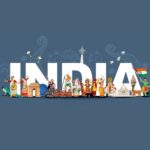India is a land of incredible diversity, and its festivals reflect its rich tapestry of cultures, religions, and traditions. Festivals in India are celebrated with immense fervor, joy, and devotion. Here’s a detailed overview:
1. Religious Festivals
Hindu Festivals
Diwali (Deepavali): Known as the Festival of Lights, Diwali celebrates the victory of light over darkness and good over evil. People light lamps, burst fireworks, and worship Goddess Lakshmi for prosperity.
Holi: The Festival of Colors, celebrated to mark the arrival of spring and the victory of good over evil. People play with colored powders, sing, dance, and enjoy festive sweets.
Navratri/Dussehra: A nine-day festival dedicated to Goddess Durga, culminating in Dussehra, which celebrates Lord Rama’s victory over Ravana.
Raksha Bandhan: A festival celebrating the bond between brothers and sisters, where sisters tie a protective thread (rakhi) on their brothers’ wrists.
Ganesh Chaturthi: Dedicated to Lord Ganesha, the remover of obstacles. Elaborate clay idols are worshiped and later immersed in water.
Islamic Festivals
Eid-ul-Fitr: Marks the end of Ramadan, the month of fasting. People pray, give charity (Zakat), and celebrate with feasts and sweets.
Eid-ul-Adha (Bakrid): Commemorates the willingness of Prophet Ibrahim to sacrifice his son as an act of obedience to God. Animals are sacrificed, and the meat is shared among family, friends, and the needy.
Muharram: The Islamic New Year and a period of mourning for the martyrdom of Imam Hussain.
Christian Festivals
Christmas: Celebrated on 25th December, marking the birth of Jesus Christ. People decorate Christmas trees, attend midnight masses, and exchange gifts.
Good Friday & Easter: Good Friday commemorates the crucifixion of Jesus, while Easter celebrates His resurrection.
Sikh Festivals
Guru Nanak Jayanti (Gurpurab): Marks the birth of Guru Nanak, the founder of Sikhism. People visit Gurudwaras, recite hymns, and partake in community feasts (Langar).
Vaisakhi: Celebrated as the harvest festival in Punjab and also marks the formation of the Khalsa in Sikhism.
Buddhist Festivals
Buddha Purnima: Celebrates the birth, enlightenment, and death of Lord Buddha. Devotees visit monasteries, meditate, and participate in processions.
2. Seasonal and Harvest Festivals
Makar Sankranti: Celebrated in January, marking the sun’s transition into Capricorn. Kite flying and sesame sweets are traditional customs.
Pongal: A Tamil harvest festival thanking the Sun God and farm animals.
Baisakhi: Apart from Sikh significance, it’s celebrated in Punjab as the harvest festival.
Onam: A harvest festival of Kerala, with floral decorations, traditional dances, boat races, and a grand feast called Onasadya.
3. Regional and Cultural Festivals
Durga Puja: Predominantly celebrated in West Bengal, Odisha, and Assam, honoring Goddess Durga with elaborate idols, pandals, and cultural programs.
Lohri: Celebrated in Punjab to mark the end of winter, with bonfires, songs, and dance.
Bihu: A set of three festivals in Assam marking the Assamese New Year and the agricultural cycle.
Chhath Puja: Observed in Bihar and Jharkhand, dedicated to Sun God for health, prosperity, and well-being.
4. National and Public Celebrations
Republic Day (26th January): Celebrates the adoption of India’s Constitution with parades, flag hoisting, and cultural performances.
Independence Day (15th August): Marks India’s freedom from British rule, celebrated with flag hoisting, patriotic programs, and ceremonies.
Gandhi Jayanti (2nd October): Honoring Mahatma Gandhi’s birth anniversary, with prayers and tributes.
5. Unique and Fun Festivals
Kumbh Mela: A massive Hindu pilgrimage held every 12 years at different locations, considered the largest human gathering on Earth.
Hornbill Festival: Celebrated in Nagaland to showcase tribal culture, crafts, and traditional performances.
Pushkar Camel Fair: A livestock fair in Rajasthan combined with cultural events, competitions, and festivities.
Significance of Indian Festivals
Cultural Unity: Festivals bring people of diverse backgrounds together.
Religious Devotion: Strengthen faith and spiritual practices.
Seasonal Awareness: Many festivals mark seasonal changes and harvests.
Social Bonding: Foster family, community, and regional connections.
Economic Activity: Boost local markets, tourism, and traditional crafts.
India’s festivals are not just days of celebration—they reflect its spiritual depth, cultural diversity, and social harmony. Every festival has a story, a tradition, and a reason for people to come together in joy, devotion, and community spirit.








